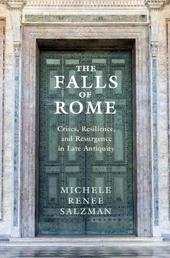
|
The Falls of Rome: Crises, Resilience, and Resurgence in Late Antiquity
Hardback
Main Details
| Title |
The Falls of Rome: Crises, Resilience, and Resurgence in Late Antiquity
|
| Authors and Contributors |
By (author) Michele Renee Salzman
|
| Physical Properties |
| Format:Hardback | | Pages:462 | | Dimensions(mm): Height 235,Width 159 |
|
| Category/Genre | Medieval European archaeology |
|---|
| ISBN/Barcode |
9781107111424
|
| Classifications | Dewey:937.09 |
|---|
| Audience | | Professional & Vocational | | Tertiary Education (US: College) | |
|---|
|
Publishing Details |
| Publisher |
Cambridge University Press
|
| Imprint |
Cambridge University Press
|
| Publication Date |
9 September 2021 |
| Publication Country |
United Kingdom
|
Description
Over the course of the fourth through seventh centuries, Rome witnessed a succession of five significant political and military crises, including the Sack of Rome, the Vandal occupation, and the demise of the Senate. Historians have traditionally considered these crises as defining events, and thus critical to our understanding of the 'decline and fall of Rome.' In this volume, Michele Renee Salzman offers a fresh interpretation of the tumultuous events that occurred in Rome during Late Antiquity. Focusing on the resilience of successive generations of Roman men and women and their ability to reconstitute their city and society, Salzman demonstrates the central role that senatorial aristocracy played, and the limited influence of the papacy during this period. Her provocative study provides a new explanation for the longevity of Rome and its ability, not merely to survive, but even to thrive over the last three centuries of the Western Roman Empire.
Author Biography
Michele Renee Salzman is Professor and Chair in the department of history at the University of California, Riverside. A recipient of fellowships from the National Endowment for the Humanities, the American Academy in Rome, the Institute for Advanced Study, Princeton, the American Philosophical Society, and the Institute for Advanced Study in Jerusalem, she is the author of On Roman Time: The Codex Calendar of 354 and the Rhythms of Urban Life in Late Antiquity and The Making of a Christian Aristocracy and General Editor of The Cambridge History of Religions in the Ancient World. She has also published The Letters of Symmachus. Book 1. Introduction, text and commentary. Translation with Michael Roberts, and co-edited two books, Pagans and Christians in Late Antique Rome: Conflict, Competition and Coexistence in the Fourth Century, with M. Saghy and R. Lizzi Testa, and Violence in Late Antiquity: Perceptions and Practices, with E. Albu, H. Drake, M. Maas, and C. Rapp.
Reviews'Michele Salzman's The Falls of Rome does nothing less than re-write the history of the city of Rome in the last centuries of the ancient world. Based on scrupulous attention to evidence of every kind, her account offers a new perspective on almost every aspect of the fate of this vast city and of the remarkable families who rallied again and again to rescue and renew it after every crisis. Here is no story of ineluctable Decline and Fall in the manner of Edward Gibbon, still less of the triumphant absorption of a pagan city by the popes of Rome. Instead, the Roman Senate and its members hold center stage. Seldom has an ancient aristocracy shown such tenacity and such resilience in difficult times. Nor has any recent scholar shown such a gift for conjuring up, from such scattered and easily-neglected evidence, the profile of the distinguished men and women, the emperors and the generals, the grandees and the priests whose dogged defense of the traditions of their unique city imposed their own pace of change on a crisis-ridden age. This is scholarship at its best. The book is a model and a masterpiece.' Peter Brown, Princeton University 'Among the many recent studies of the fall of the Roman Empire, the city of Rome is often understood as the handmaiden to the process of decline and ruin. Michele Salzman's book is the first of its kind to place the ancient capital in proper perspective and, in doing so, breathes new life into exhausted narratives. Meticulously researched and elegantly argued, this book traces the role of the elites at Rome through the dramatic changes of the Empire's last centuries and finds that, in spite of the intimate symbiosis of city to Empire, the leading citizens of Rome were the authors of continued vitality and resilience in the face of repeated disasters. As a scholar of urban and social history, Salzman is exemplary, and The Falls of Rome is destined to become the foundation of future studies of the city for decades to come.' Shane Bjornlie, Claremont McKenna College 'In The Falls of Rome, Michele Salzman offers a gripping account of the disasters that struck the Eternal City between the third and seventh centuries and the efforts Roman senators and bishops made to bring the city back from catastrophe. The city of Rome and the elites who shaped it all come alive as Salzman recounts the multiple crises and recoveries that together demonstrate how Rome's resilience grew out of the dedication of its civic leaders.' Edward Watts, University of California, San Diego 'Who? What? When? Where? Why? Michele Salzman draws on her broad and deep erudition to revisit the whodunnit that is the Roman empire from Constantine to Justinian and a little after. She tracks the sometimes suspicious, often obtuse behavior of the grandly self-absorbed aristocrats of the age to tell a story far richer than mere epic narrative.' James O'Donnell, University of Arizona
|